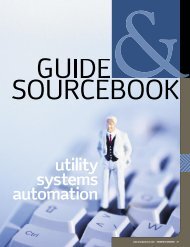CEO Turnover - Description
CEO Turnover - Description
CEO Turnover - Description
You also want an ePaper? Increase the reach of your titles
YUMPU automatically turns print PDFs into web optimized ePapers that Google loves.
Municipal Utilities<br />
A number of the nation’s municipal utilities<br />
have taken an aggressive stand in reducing<br />
global emissions, typically by investing in<br />
alternative and renewable energy projects.<br />
“We believe climate change is an important<br />
issue, and it has been on our radar scope<br />
for a long time,” says Bud Beebe, regulatory<br />
affairs coordinator of California’s Sacramento<br />
Municipal Utility District (SMUD). The utility has<br />
studied the greenhouse gas emission issue since<br />
1990 and worked to solve it in three ways:<br />
28 ENERGYBIZ MAGAZINE March/April 2005<br />
Aggressive<br />
Improve the efficiency of current plants<br />
by investing in co-generation projects and<br />
combined-cycle, natural gas plants,<br />
Reduce customer demand by launching energy<br />
conservation projects in its service area, and<br />
Switch to less polluting energy, including<br />
renewable energy sources such as wind farms,<br />
and commit to an aggressive goal of making<br />
renewable energy 20 percent of its total<br />
energy mix by 2011.<br />
in<br />
Fighting Emissions<br />
Beebe says SMUD also works closely with alternative<br />
providers of wind, solar and geothermal energy<br />
to spur the market by agreeing to purchase the<br />
energy generated. SMUD may even form a partnership<br />
to develop solar thermal electrical generation.<br />
“That is an energy technology that is high on the<br />
list,” he says. “We think we can show that it really<br />
works — that it is reliable and cost-effective.”<br />
Also on SMUD’s energy horizon is non-conventional,<br />
direct-burn biomass. “We’re<br />
committed to the ongoing growth of the<br />
renewable energy market,” Beebe explains.<br />
You have to address it,<br />
whatever you believe<br />
science is telling us.<br />
“Industry executives realize that the Bush<br />
Administration policy may not hold forever,” says<br />
Barry Worthington, executive director of the U.S.<br />
Energy Association. “There are going to be other<br />
administrations some day.”<br />
Some companies want to position themselves<br />
ahead of changes – especially in the area of carbon<br />
dioxide emissions that might be mandated in the<br />
future. In fact, Worthington believes some executives<br />
see the day coming when reductions will be mandatory<br />
and monetized. Some would rather see federal<br />
mandates arrive before they retire their old polluting<br />
plants so they can gain some financial offsets.<br />
Additionally, there is a general growing awareness<br />
that global warming is a problem and increasing<br />
pressure from shareholders and state regulators<br />
for energy and utility companies to do something<br />
about it, Worthington notes. In fact, last year<br />
a coalition of more than 80 investment funds,<br />
environmental organizations and public interest<br />
groups brought shareholder pressure on several<br />
utility companies to focus on the potential risks to<br />
shareholders posed by carbon dioxide emissions.<br />
Southern Company and TXU eventually agreed<br />
to report publicly on how they are planning for<br />
potential emission constraints. Reliant Energy<br />
agreed to make plans to improve the measurement<br />
and disclosure of the financial impact of its<br />
emissions. Last December, the California Public<br />
Utility Commission began requiring utilities to<br />
account for the future cost of reducing carbon<br />
emissions in choosing energy sources.<br />
Worthington says such actions underscore a<br />
growing debate over global warming and signal<br />
increased industry acceptance that “you have to address<br />
it, whatever you believe science is telling us.”


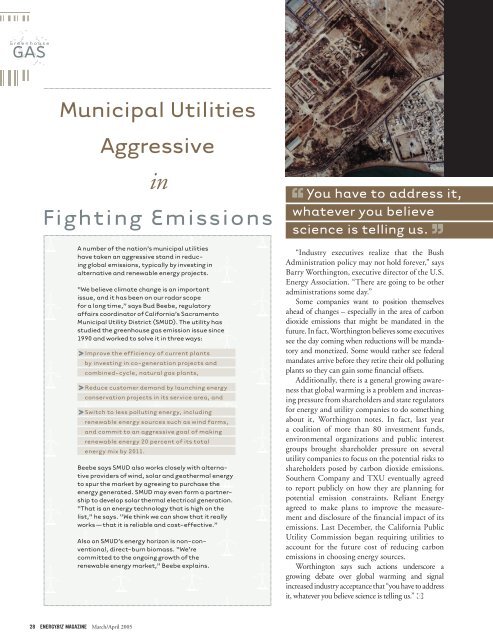


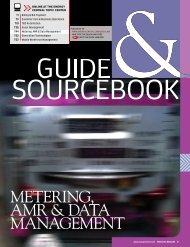

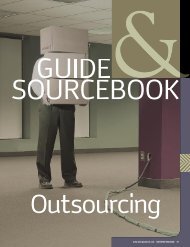


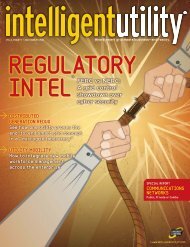
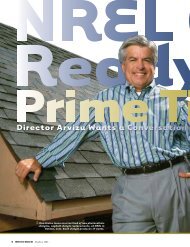

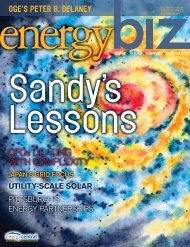
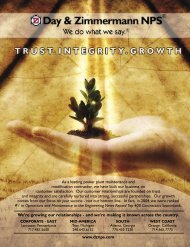
![View From the Trenches [PDF]](https://img.yumpu.com/18854438/1/190x252/view-from-the-trenches-pdf.jpg?quality=85)
